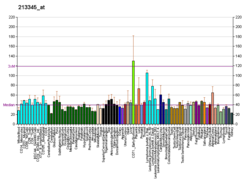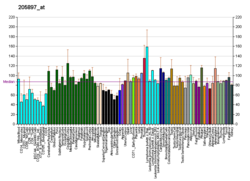NFATC4
Nuclear factor of activated T-cells, cytoplasmic 4 is a protein that in humans is encoded by the NFATC4 gene.[5][6]
Function
[edit]The product of this gene is a member of the nuclear factors of activated T cells DNA-binding transcription complex. This complex consists of at least two components: a preexisting cytosolic component that translocates to the nucleus upon T cell receptor (TCR) stimulation and an inducible nuclear component. Other members of this family of nuclear factors of activated T cells also participate in the formation of this complex. The product of this gene plays a role in the inducible expression of cytokine genes in T cells, especially in the induction of the IL-2 and IL-4.[6]
Interactions
[edit]NFATC4 has been shown to interact with CREB-binding protein.[7]
See also
[edit]References
[edit]- ^ a b c ENSG00000285485 GRCh38: Ensembl release 89: ENSG00000100968, ENSG00000285485 – Ensembl, May 2017
- ^ a b c GRCm38: Ensembl release 89: ENSMUSG00000023411 – Ensembl, May 2017
- ^ "Human PubMed Reference:". National Center for Biotechnology Information, U.S. National Library of Medicine.
- ^ "Mouse PubMed Reference:". National Center for Biotechnology Information, U.S. National Library of Medicine.
- ^ Hoey T, Sun YL, Williamson K, Xu X (May 1995). "Isolation of two new members of the NF-AT gene family and functional characterization of the NF-AT proteins". Immunity. 2 (5): 461–72. doi:10.1016/1074-7613(95)90027-6. PMID 7749981.
- ^ a b "Entrez Gene: NFATC4 nuclear factor of activated T-cells, cytoplasmic, calcineurin-dependent 4".
- ^ Yang T, Davis RJ, Chow CW (Oct 2001). "Requirement of two NFATc4 transactivation domains for CBP potentiation". The Journal of Biological Chemistry. 276 (43): 39569–76. doi:10.1074/jbc.M102961200. PMID 11514544.
Further reading
[edit]- Rao A, Luo C, Hogan PG (1997). "Transcription factors of the NFAT family: regulation and function". Annual Review of Immunology. 15: 707–47. doi:10.1146/annurev.immunol.15.1.707. PMID 9143705.
- Crabtree GR (Mar 1999). "Generic signals and specific outcomes: signaling through Ca2+, calcineurin, and NF-AT". Cell. 96 (5): 611–4. doi:10.1016/S0092-8674(00)80571-1. PMID 10089876. S2CID 8817053.
- Horsley V, Pavlath GK (Mar 2002). "NFAT: ubiquitous regulator of cell differentiation and adaptation". The Journal of Cell Biology. 156 (5): 771–4. doi:10.1083/jcb.200111073. PMC 2173310. PMID 11877454.
- Jabado N, Le Deist F, Fisher A, Hivroz C (Nov 1994). "Interaction of HIV gp120 and anti-CD4 antibodies with the CD4 molecule on human CD4+ T cells inhibits the binding activity of NF-AT, NF-kappa B and AP-1, three nuclear factors regulating interleukin-2 gene enhancer activity". European Journal of Immunology. 24 (11): 2646–52. doi:10.1002/eji.1830241112. PMID 7957556. S2CID 30435577.
- Vacca A, Farina M, Maroder M, Alesse E, Screpanti I, Frati L, Gulino A (Nov 1994). "Human immunodeficiency virus type-1 tat enhances interleukin-2 promoter activity through synergism with phorbol ester and calcium-mediated activation of the NF-AT cis-regulatory motif". Biochemical and Biophysical Research Communications. 205 (1): 467–74. doi:10.1006/bbrc.1994.2689. PMID 7999066.
- Di Somma MM, Majolini MB, Burastero SE, Telford JL, Baldari CT (Sep 1996). "Cyclosporin A sensitivity of the HIV-1 long terminal repeat identifies distinct p56lck-dependent pathways activated by CD4 triggering". European Journal of Immunology. 26 (9): 2181–8. doi:10.1002/eji.1830260933. PMID 8814265. S2CID 23430217.
- Molkentin JD, Lu JR, Antos CL, Markham B, Richardson J, Robbins J, Grant SR, Olson EN (Apr 1998). "A calcineurin-dependent transcriptional pathway for cardiac hypertrophy". Cell. 93 (2): 215–28. doi:10.1016/S0092-8674(00)81573-1. PMC 4459646. PMID 9568714.
- Aramburu J, Garcia-Cózar F, Raghavan A, Okamura H, Rao A, Hogan PG (Apr 1998). "Selective inhibition of NFAT activation by a peptide spanning the calcineurin targeting site of NFAT". Molecular Cell. 1 (5): 627–37. doi:10.1016/S1097-2765(00)80063-5. PMID 9660947.
- Chow CW, Davis RJ (Jan 2000). "Integration of calcium and cyclic AMP signaling pathways by 14-3-3". Molecular and Cellular Biology. 20 (2): 702–12. doi:10.1128/MCB.20.2.702-712.2000. PMC 85175. PMID 10611249.
- Graef IA, Chen F, Chen L, Kuo A, Crabtree GR (Jun 2001). "Signals transduced by Ca(2+)/calcineurin and NFATc3/c4 pattern the developing vasculature". Cell. 105 (7): 863–75. doi:10.1016/S0092-8674(01)00396-8. PMID 11439183. S2CID 5278706.
- Yang T, Davis RJ, Chow CW (Oct 2001). "Requirement of two NFATc4 transactivation domains for CBP potentiation". The Journal of Biological Chemistry. 276 (43): 39569–76. doi:10.1074/jbc.M102961200. PMID 11514544.
- Yang TT, Xiong Q, Enslen H, Davis RJ, Chow CW (Jun 2002). "Phosphorylation of NFATc4 by p38 mitogen-activated protein kinases". Molecular and Cellular Biology. 22 (11): 3892–904. doi:10.1128/MCB.22.11.3892-3904.2002. PMC 133816. PMID 11997522.
- Bennasser Y, Badou A, Tkaczuk J, Bahraoui E (Nov 2002). "Signaling pathways triggered by HIV-1 Tat in human monocytes to induce TNF-alpha". Virology. 303 (1): 174–80. doi:10.1006/viro.2002.1676. PMID 12482669.
- Graef IA, Wang F, Charron F, Chen L, Neilson J, Tessier-Lavigne M, Crabtree GR (May 2003). "Neurotrophins and netrins require calcineurin/NFAT signaling to stimulate outgrowth of embryonic axons". Cell. 113 (5): 657–70. doi:10.1016/S0092-8674(03)00390-8. PMID 12787506. S2CID 18024622.
- Lahti AL, Manninen A, Saksela K (May 2003). "Regulation of T cell activation by HIV-1 accessory proteins: Vpr acts via distinct mechanisms to cooperate with Nef in NFAT-directed gene expression and to promote transactivation by CREB". Virology. 310 (1): 190–6. doi:10.1016/S0042-6822(03)00164-8. PMID 12788643.
External links
[edit]- NFATC4+protein,+human at the U.S. National Library of Medicine Medical Subject Headings (MeSH)
This article incorporates text from the United States National Library of Medicine, which is in the public domain.






